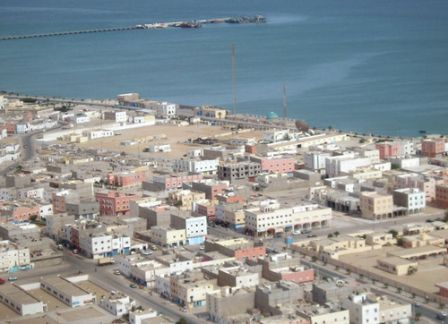A Sunday in Dakhla, a day not really like the others…
 The day of Sunday 14th August, was a day not like the other days of the year for the inhabitants of the Dakhla city. It was the celebration of the 32nd anniversary of the recovery of Oued Eddahab Province, an important historical event symbolizing a lot for the Moroccan nation and particularly the inhabitants of the Southern provinces of the Kingdom. It is also an event which would remain engraved for ever in golden letters, in the memory of the whole people, because it constitutes a crucial stage in the process of completing its integrity and the consecration of its national unity. Since 32 years, the Oued Eddahab populations, in all their tribal composition, has been able through their leading citizens and their Oulemas, their Shioukhs, to move till Rabat, on August 14, 1979, to renew their oath of allegiance and reaffirm their indefectible attachment to the Alaoui Throne. Today, the Sahrawi inhabitants remember this event unique of its kind in the history of the Kingdom, to reaffirm their continued mobilization in support of their King Mohammed VI, to defend the territorial integrity of the Kingdom, its sovereignty and unity.
The day of Sunday 14th August, was a day not like the other days of the year for the inhabitants of the Dakhla city. It was the celebration of the 32nd anniversary of the recovery of Oued Eddahab Province, an important historical event symbolizing a lot for the Moroccan nation and particularly the inhabitants of the Southern provinces of the Kingdom. It is also an event which would remain engraved for ever in golden letters, in the memory of the whole people, because it constitutes a crucial stage in the process of completing its integrity and the consecration of its national unity. Since 32 years, the Oued Eddahab populations, in all their tribal composition, has been able through their leading citizens and their Oulemas, their Shioukhs, to move till Rabat, on August 14, 1979, to renew their oath of allegiance and reaffirm their indefectible attachment to the Alaoui Throne. Today, the Sahrawi inhabitants remember this event unique of its kind in the history of the Kingdom, to reaffirm their continued mobilization in support of their King Mohammed VI, to defend the territorial integrity of the Kingdom, its sovereignty and unity.
Through their act of allegiance, the inhabitants of Oued Eddahab have in reality made the oath to never sell off their Moroccan identity or make the slightest concession of a grain of sand of the land of their ancestors. At the same time, the inhabitants of different Sahrawi tribes have sent to the whole world, a message full of meanings that the Sahara has always been Moroccan and would remain so for ever despite of the manoeuvres of the national unity’s adversaries. The struggle led by Moroccans to defend this unity, took its strength from the old harmony existing between the people and the throne, through the act of allegiance or Beia. This same act which constitutes a commitment to defend the highest interests of the nation, its sovereignty and dignity. Since its return to the homeland, the Oued Eddahab province has known, like other Southern Provinces, a great development never known before, which has come to fill the gaps inherited from the old colonial power. The new Constitution approved almost unanimously by the Moroccan people, has come to prepare the ground for a large regionalization and a territorial democracy at the level of all the regions of the Kingdom. Thus the ground is prepared for a large autonomy for the Southern Provinces, an autonomy which is at the heart of the solution offered by Morocco to the opponent party, to definitely settle this old conflict of the Western Sahara.
